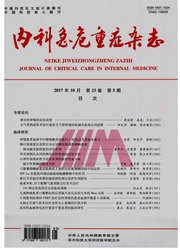

 中文摘要:
中文摘要:
目的:探讨血液透析滤过(HDF)对维持性血液透析(MHD)患者红细胞生成素(EPO)敏感性的影响及其可能的机制.方法:44例MHD患者随机分为高通量血液透析滤过组(HDF组)和常规低通量血液透析组(HD组),干预12周,测定干预前、后高敏C反应蛋白(hs-CRP)、肿瘤坏死因子α(TNF-d)、白介素-6(IL-6)、血清白蛋白(ALB)、前白蛋白(preALB)、全段甲状旁腺激素(iPTH)、总胆固醇(TC)水平,并计算红细胞生成素抵抗指数(ERI)和营养不良-炎症评分(MIS);结果:HDF组ERI、MIS、hs-CRP、TNF-α、IL-6、iPTH均降低,TC升高,与HD组比较均具显著差异(P<0.05);逐步回归分析提示对ERI的影响有统计学意义的变量,依次为MIS、IL-6、hs-CRP、iPTH、ALB(P<0.05).结论:HDF可显著降低MHD患者体内炎性因子水平、减轻微炎症状态、改善营养状况,降低ERI水平,增加EPO的敏感性.
 英文摘要:
英文摘要:
Objective : To investigate the influence of hemodiafihration (HDF) on the responsiveness to erythropoi- etin (EPO) in patients on maintenance hemodialysis (MHD) and its mechanism. Methods: A total of 44 patients on MHD were randomly divided into HDF group and HD group, and were given HDF or HD therapy respectively for 12 weeks. The high sensitivity C-reactive protein (hs-CRP) , tumor necrosis factor-α (TNF-α) , interleukin-6 (IL-6), serum albumin (ALB) , prealbumin (preALB) , intact parathyroid hormone (iPTH) , total cholesterol (TC) were detected before and after treatment. The erythropoietin resistance index ( ERI ) and malnutrition-inflammation score (MIS) were calculated. Results: The levels of ERI, MIS, hs-CRP, TNF-α, IL-6 and iPTH decreased significantly in HDF group, but the level of TC increased markedly. All above parameters showed significant difference as compared with those in HD group (P 〈 0.05 ). In backward stepwise regression analysis, ERI was associated with MIS, IL-6, hs-CRP, iFFH and ALB. MIS was the biggest impact factor, followed by IL-6, hs-CRP, iPTH and ALB (P 〈 0.05). Conclusion : HDF could decrease the level of proinflammatory cytokines, alleviate microinflammatory state and improve nutritional status, then decrease ERI and improve the responsiveness to erythropoietin in MHD patients.
 同期刊论文项目
同期刊论文项目
 同项目期刊论文
同项目期刊论文
 期刊信息
期刊信息
